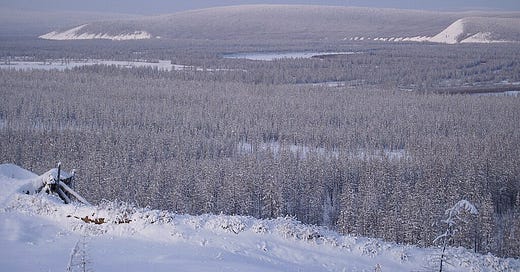I was going to call this entry On Squiddle-biddle-and-a-half, but as Skibidi is now such a crossover thing I’ve decided to be more sober and direct.
This is some advice I often need to take myself.
In a Zero Draft, rhythm is more important than fact.
You find yourself writing —
The temperature out on the frozen lake was minus…
Don’t stop there. Don’t Google. Don’t do your reasearch. Just put in:
The temperature out on the frozen lake was minus squiddle-biddle or lah-di-dah degrees…
And keep writing, without a pause.
Keep telling the story.
You know it’s cold. Really cold. But you don’t need to fill your head with other people’s words or images.
If you look up the Wikipedia entry on lowest recorded nighttime temperature in the midwinter Soviet taiga, you’ll have detoured into the rhythm of fact rather than story.
Inserting lah-di-dah or no bloody clue or squiddle-biddle-and-a-half or a plain guess of -53oC is much more likely to keep you inventively going.
Not all writers are going to want to do this.
Some of them, and you may be one of them, feel they need to know that the temperature is -53oC before they can set out into the howling wilderness of that next sentence.
Because really cold isn’t accurate enough.
For them to write squiddle-biddle-and-a-half is existentially terrifying. They just can’t do it.
They need the security of fact before they can attempt the rhythm of story.
I can absolutely understand why.
But in this case, aren’t they turning themselves into a non-fiction writer, rather than a writer of fiction?
I don’t mean that’s the form they’re writing in, I mean that’s the way they’re writing it.
Many novelists are — in my view — secretly non-fiction writers of fiction. They approach each paragraph as a commission from themselves.
For them, writing is a responsible business proposition, rather than an irresponsible playing field.
The non-fiction fiction writer doesn’t do a Draft Zero, because they can’t be that lost — they’re already on to the First Draft.
They may even be on the to Second Draft, because the First Draft was the commission or pitch they sold to themselves.
Say you’re sitting there thinking Can I write a story set in the Soviet taiga?
In my view, it’s pointless even considering this.
You can and You are forgiven.
Far better to start, immediately, making stuff up, guesstimating, draft zeroing and trying to get the rhythm going.
(I’m back to drumming.)
You may make surprising progress, or you may get stuck in the snow almost immediately.
But you know snow already. You know vastness. You know isolation.
You may even know your main character.
And you will have learned more from your reckless adventure into whiteness and blackness and coldness than you would done from worrying over Can I? (Do I have permission?) Can I? (Do I have the ability?) Can I? (Will someone who knew the taiga at that period tell me it went down to -63oC?)
An attempt that stalls may take you to a point from which you can start.
Start what you thought you were going to write, or start something apparently completely different.
I’ve come to believe that most of the books I’ve written only exist because of other books, sometimes similar, I’ve failed to write.
This is all about unfreezing what seemed cold and dead.
Without the rich compost of decaying hopes and disintegrating plans, no green growth is possible.
Better to have a litter of broken projects than a clean, clear white page.




